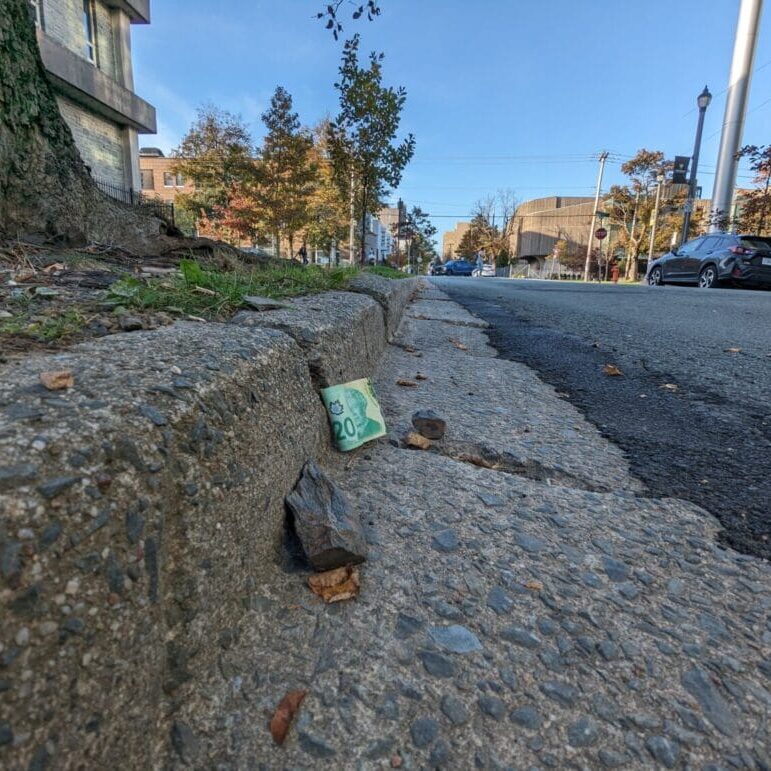
Cash infusions for the homeless could help now, but not forever
We shouldn’t be satisfied with a one-off solution to a continuing problem
If your roof leaks, don’t build a drain in your floor. If you have no roof, don’t be satisfied with one cash infusion and an invitation to dig yourself out of a government-mandated pit. To fix homelessness, we need to deal with its causes, rather than treat its symptoms.
A study from the University of British Columbia has recently espoused the benefits of providing one-time $7,500 cash transfers to people experiencing homelessness. The study touted that recipients spent fewer days in shelters, were able to save money and incurred a lower cost-per-person than if their subject relied entirely on publicly-available supports.
The study never claims to be a cure-all, nor is it blind to its limited sample size and demographic reach. Unfortunately, the structural shortcomings of Canadian communities which cause and maintain homeless populations are rarely emphasized in the study and its accompanying media coverage. Nobody would argue that $7,500 cash would improve almost anybody’s life, housed or not, but single-shot solutions should make up only a small portion of the conversation on ending homelessness.
Would this program ever migrate east?
Advocates in Halifax have already begun to signal boost the method, and there’s no doubting that this is an appealing initiative to get behind for a government mired in charges of inefficacy on housing.
Should this policy be implemented, it will not be enough, but it will be touted as a cutting-edge response to homelessness. Demonstrably, it is not.
For decades, Canadian governments have been shrinking their scope of responsibilities by analyzing social issues from their end point, rather than their genesis. The War on Drugs moved to imprison, rather than aid, drug users. Public funding for education has been steadily falling in recent decades. Halifax City Council prefers the creation of tent spaces over adequate housing.
When the cutting is done, we’re left with the impossible task of amending systemic injustices through the power of individual self-reliance. Sadly, bootstrap pulling and elbow grease won’t do the job when the job is saving the lives of hundreds of residents. Cash infusion is only a component of the solution; it must be backed by systemic improvements and new safety nets which guarantee the success of those it intends to help.
Short of de-commodifying housing, healthcare, and the rest, here’s what to consider:
Assume a similar project is implemented tomorrow. Halifax’s often-cited one per cent vacancy rate will be of no help to those newly-semi-solvent people attempting to break from the grasp of shelters, tents and couches. But the provincial government doesn’t seem keen on letting the HRM fix this and, as previously written in the Gazette’s opinions section, isn’t offering any plan more solid than a morning affirmation.
“I will create more affordable housing, I will expand our supports for the homeless population,” said Tim Houston, probably, for the past 787 mornings since he’s been at the helm. “I do not need a specific plan.”
There are more problems with the hypothetical policy. The study admits that it did not account for those with substance use issues, mental health considerations or experiences of domestic violence; all of which are key contributors to homelessness. Services meant to alleviate these pressures are not easily accessed in Nova Scotia, and potential patients are forced to jump through hoops and hyperlinks that occasionally lead to old web pages or nothing at all when searching online. The Nova Scotia government, self-destructively, keeps track of wait times for mental health services. Peruse them here, if you’ve got no first-hand experience with the province’s supports.
The province’s emergency room wait times tracker is a handy tool for demonstrating how long Nova Scotia’s urban homeless population would be waiting for urgent care; the endurance necessary to get medical help in some areas is inhuman. It’s not unreasonable that increasing numbers of people are leaving emergency departments without being treated.
Let’s do it, and other things too. Lots of other things.
Barring the improvement of physical and mental health services, affordable housing and other necessities, there are no guarantees that this $7,500 can be exchanged for long-term improvement in the lives of unhoused people. The province would also need a comprehensive plan for disbursement that includes more than visiting shelters with a bag of cash if they want to aid the hidden homeless and those in the healthcare system.
The beneficiaries of the infusion will be on their own once the cheque is cashed, unless safety nets and broader changes are enacted to prevent people from having to start over. This infusion is a good idea, just as all supports are for those with inadequate housing; it needs only be combined with other, good, ideas.
Consider this a plea to federal, provincial and municipal governments to design equitable communities, rather than just ponying up and backing off.






